Birds, just like humans, can experience constipation. It is a condition where the digestive system struggles to eliminate waste effectively, leading to discomfort and potential health complications.
Recognizing the signs of constipation in birds and knowing how to treat and prevent it is essential for the well-being of our feathered friends.
Typically, birds constipate due to poor hydration and improper diet. Stress, lack of exercise, and internal blockage can also be the reasons. In some cases, constipation is caused by underlying health conditions.
Let’s dive in and explore the causes of bird constipation, how to identify it, and effective treatment options.
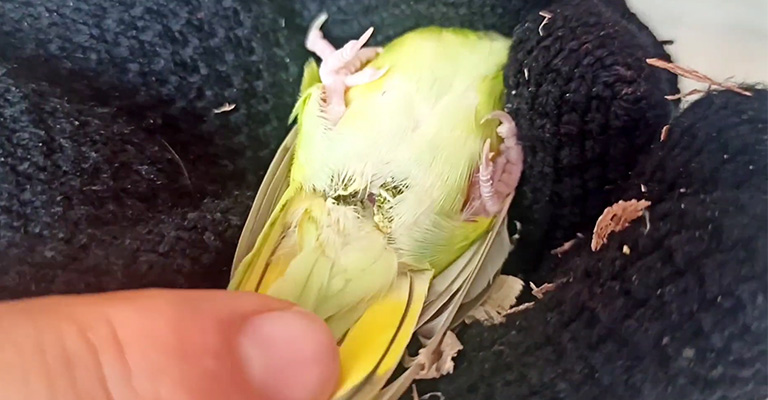
Why Do Birds Constipate?
Birds can experience constipation due to various reasons, and here are some-
Dehydration
One common cause of constipation in birds is dehydration. When birds don’t consume enough water, their digestive system can dry, making it difficult for waste to move through the intestines.
Dehydration can occur due to various factors, such as limited access to fresh water, environmental conditions, or certain illnesses.
Inadequate Diet
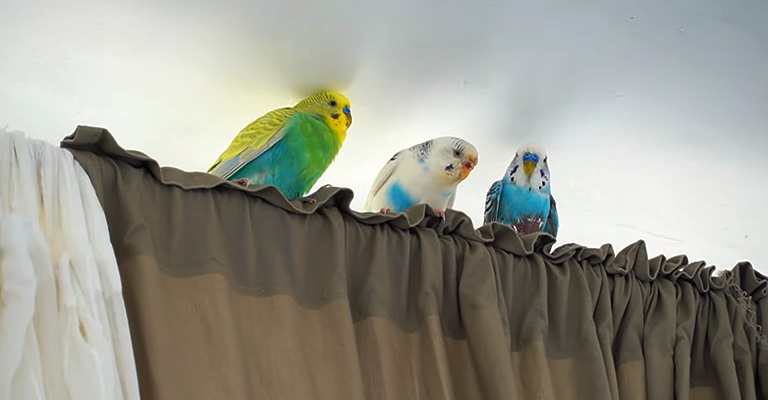
A diet lacking dietary fiber can lead to bird constipation. Birds require a balanced diet with enough fruits, vegetables, and other fibrous foods. The lack of fiber can result in slower bowel movements and difficulty passing waste.
Lack of Exercise
Insufficient physical activity can contribute to constipation in birds. Birds need regular exercise to maintain a healthy digestive system. A sedentary lifestyle or confinement in tiny cages can lead to decreased muscle tone and sluggish digestion, increasing the likelihood of constipation.
Ingestion of Indigestible Substances
Birds are curious creatures who occasionally ingest non-food items such as fabric, plastic, or other foreign objects. These indigestible substances can obstruct the digestive tract, leading to constipation or intestinal blockages.
Medical Conditions
Certain medical conditions can cause constipation in birds. For example, gastrointestinal disorders, infections, tumors, or malformations can disrupt normal digestion and constipation. In these cases, it’s essential to consult an avian veterinarian for a proper diagnosis and treatment.
Stress and Anxiety
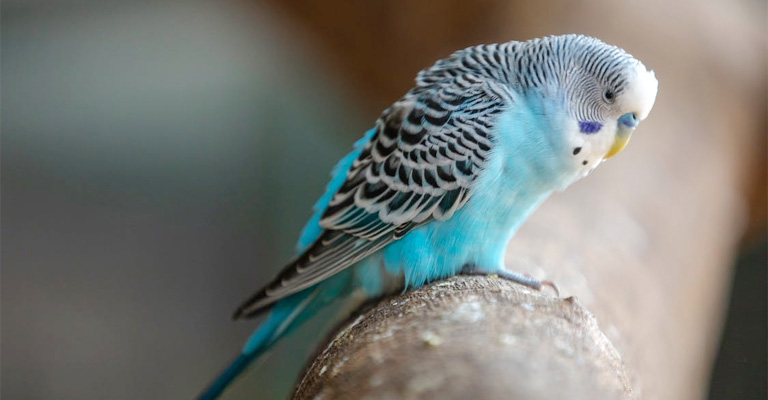
Birds are sensitive creatures, and stress or anxiety can impact their overall well-being, including their digestive system. Environmental changes, such as moving to a new home, the presence of predators or other pets, or loud noises, can stress birds and lead to constipation.
Medications and Dietary Changes
Some medications or sudden changes in diet can affect a bird’s digestive system and lead to constipation. Antibiotics, specific supplements, or a rapid transition to a new diet without proper acclimation can disrupt the natural balance of gut bacteria or cause dietary imbalances that affect digestion.
It’s crucial to address constipation in birds promptly to avoid further complications. If you suspect your bird is constipated, provide fresh water, ensure a balanced diet with adequate fiber, encourage exercise, and monitor bowel movements.
If constipation persists or is accompanied by other concerning symptoms, consult an avian veterinarian for a proper diagnosis and treatment plan.
How Do I Know If My Bird Is Constipated?
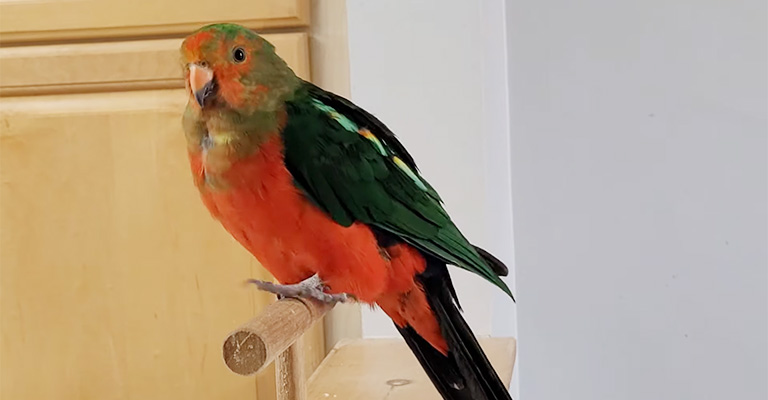
You can observe several signs and behaviors to determine if your bird is constipated. Here are some points-
Lack of or Changes in Droppings
Monitor your bird’s droppings regularly. If you notice a significant decrease in the frequency or volume of droppings, or if the droppings appear dry, minor, or complex, it could indicate constipation. Normal droppings should have a combination of solid and liquid components.
Straining or difficulty Defecating
If your bird shows signs of straining, such as repeatedly assuming a squatting posture, pushing or stretching while attempting to defecate, or showing visible discomfort during defecation, it could indicate constipation.
Absence of Urine
Birds usually produce feces and urine as separate components of their droppings. If you observe a lack of urine in the droppings or notice that the feces are dry and devoid of liquid content, it may suggest constipation.
Reduced Appetite
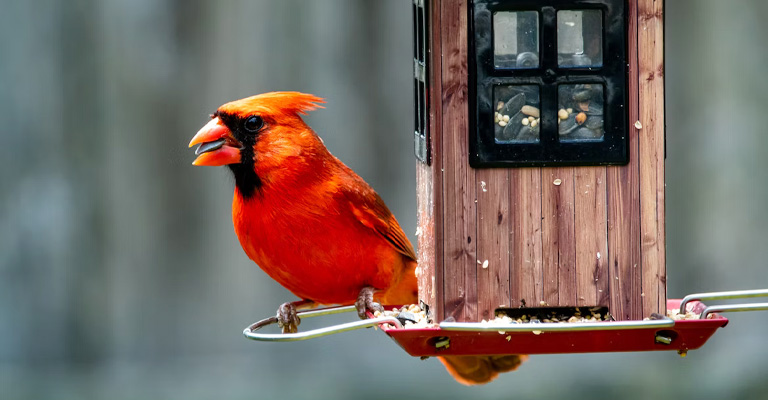
Constipation can lead to a loss of appetite or decreased bird food intake. If your bird shows a sudden decrease in interest in food or is reluctant to eat, it may be a sign of digestive discomfort or constipation.
Abdominal Distension or Discomfort
Constipation can cause the bird’s abdomen to appear swollen or distended. You may notice a visibly enlarged or bloated area in the abdominal region. The bird may also exhibit discomfort, such as restlessness, frequent wing flapping, or vocalizing in distress.
Decreased Activity or Lethargy
Birds experiencing constipation may exhibit a decrease in their normal activity levels. They may appear lethargic, spend more time sitting or perching in one place, or show signs of weakness or fatigue.
Straining during Egg-Laying (in female birds)
Female birds, especially those prone to egg-binding, may experience constipation due to difficulty passing an egg. If you notice your female bird straining or showing signs of distress during egg-laying, it’s essential to seek immediate veterinary assistance.
How To Treat A Constipated Bird With Warm Water?
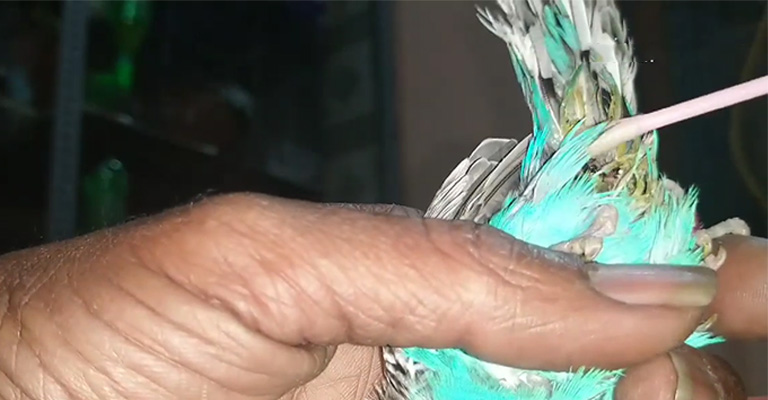
Treating a constipated bird with warm water can help provide relief and promote bowel movements.
Here are points with detailed explanations of how to administer warm water to a constipated bird:
Prepare Warm Water
Start by preparing a small bowl or container of warm water. Ensure the water is lukewarm, not hot, to avoid burning or discomfort for the bird. Test the temperature with your finger to make sure it’s suitable.
Create a Soaking Area
Set up a designated area for the bird to soak in the warm water. This can be a shallow dish or a small basin. Place a clean towel or non-slip liner at the bottom of the container to provide a secure footing for the bird.
Introduce the bird to the Soaking Area
Gently place the constipated bird in the soaking area, allowing it to stand or sit in the warm water. Supervising the bird closely during this process is vital to ensure its safety and prevent accidents.
Encourage Relaxation
Create a calm and soothing environment to help the bird relax. You can dim the lights, play soft music, or speak in a gentle and reassuring tone. A relaxed state can aid in relieving tension and facilitating bowel movements.
Monitor the Bird’s Response
Observe the bird’s behavior in the warm water. Some birds may feel immediate relief and defecate within a few minutes. Others may take longer or require repeated soaking sessions. Monitor for any signs of distress or discomfort.
Patience and Support
Be patient during the process, as it may take time for the warm water to have an effect. Provide gentle support to the bird by offering a secure hand or perch to hold onto while in the soaking area. Avoid forcing the bird or causing stress during the treatment.
Offer Fresh Water and Hydration
Provide the bird with fresh drinking water after the soaking session. Hydration is crucial for proper digestion and bowel movements. Ensure clean water is readily available at all times to encourage regular hydration.
Consult a Veterinarian if Needed
If constipation persists despite the warm water treatment or if the bird shows signs of worsening symptoms, it’s crucial to consult an avian veterinarian.
They can thoroughly examine, offer further guidance, and address any underlying health issues contributing to constipation.
What Are The Other Ways To Treat A Constipated Bird?
Apart from using warm water, there are other ways to treat a constipated bird.
Here are points with detailed explanations of alternative methods to alleviate constipation in birds:
Increase Hydration
Ensure your bird has access to clean, fresh water. Encourage drinking by offering water in different containers, such as shallow dishes or water bottles, to suit your bird’s preferences.
Some birds may prefer misting or spraying with water, which can also help stimulate hydration and bowel movements.
Dietary Modifications
Adjusting your bird’s diet can play a significant role in relieving constipation. Increase the fiber content in their diet by offering fresh fruits, vegetables, and leafy greens.
Avoid feeding a diet exclusively of dry seeds, as they lack sufficient fiber. Consult an avian veterinarian for appropriate dietary changes for your specific bird species.
Soaked or Sprouted Foods
Soaking or sprouting certain foods can increase their moisture content and make them easier to digest. Offer soaked or sprouted seeds, grains, or legumes as part of your bird’s diet.
Soaking or sprouting helps soften the food and increases its nutritional value, which can aid in relieving constipation.
Probiotics and Digestive Enzymes
Adding probiotics and digestive enzymes to your bird’s diet can promote healthy gut flora and aid digestion. These supplements can help improve the bird’s digestive health and alleviate constipation. Consult an avian veterinarian to determine the appropriate probiotics and digestive enzymes for your bird’s needs.
Encourage Physical Activity
Regular physical activity and exercise are essential for maintaining a healthy bird digestive system. Encourage your bird to engage in play, provide opportunities for flying or hopping around, and offer various toys and perches to keep them active. Increased movement can stimulate bowel movements and prevent constipation.
Gently Massage the Abdomen
With clean hands and a gentle touch, you can massage your bird’s abdomen to promote bowel movements. Use gentle circular motions or strokes in the direction of the digestive tract.
Be cautious and responsive to your bird’s reactions to ensure they are comfortable during the massage.
Seek Veterinary Assistance:
If constipation persists or worsens despite attempting home remedies, it is essential to consult an avian veterinarian. They can conduct a thorough examination, determine the underlying cause of constipation, and provide appropriate treatment options.
A veterinarian’s expertise is especially crucial if other concerning symptoms accompany constipation or if it becomes a recurring issue.
FAQs
It is not recommended to administer human laxatives or over-the-counter remedies without consulting a veterinarian. Birds have unique physiological systems and medications intended for humans can be toxic or harmful to them.
The recovery time varies depending on the underlying cause and severity of the constipation. With appropriate treatment and care, most birds show improvement within a few days to a week. However, it is essential to follow the veterinarian’s advice and monitor the bird closely during recovery.
Yes, stress can disrupt a bird’s digestion and lead to constipation. Birds are sensitive creatures, and environmental changes, such as moving to a new location or introducing new family members or pets, can cause stress and potentially result in constipation.
Increasing hydration, offering fiber-rich foods, and providing warm baths are natural remedies that can help alleviate constipation in birds. However, it is crucial to consult with a veterinarian for proper diagnosis and guidance.
Yes, constipation can be a symptom of underlying health conditions such as organ dysfunction or tumors. If your bird’s constipation persists or is accompanied by other concerning symptoms, it is crucial to consult a veterinarian for a comprehensive examination and proper diagnosis.
Final Words
So, that was all about bird constipation treatment. Constipation is a condition that can affect birds, causing discomfort and potential health complications.
By understanding the causes, recognizing the signs, and taking appropriate measures, we can effectively treat and prevent constipation in our feathered companions.
Maintaining a balanced diet, providing adequate hydration, encouraging exercise, and seeking professional veterinary care when needed are essential for the overall digestive health and well-being of our avian friends.